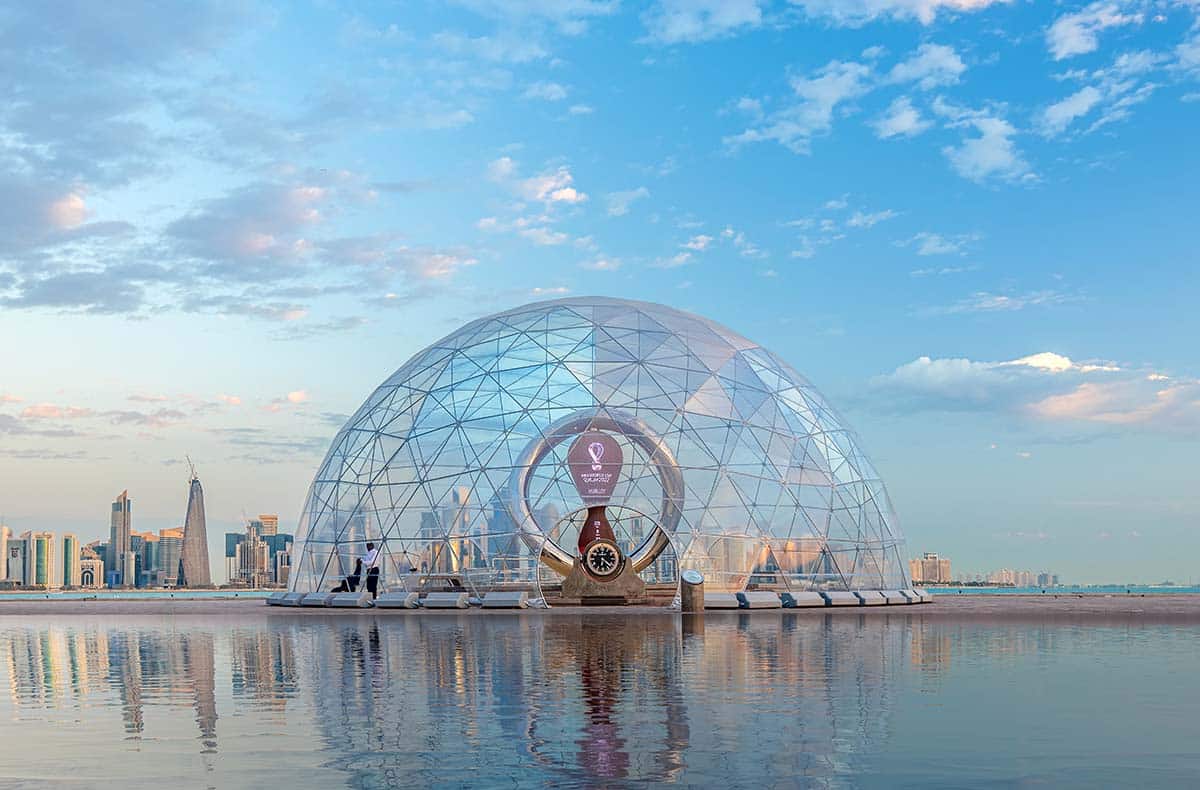
12 years ago in December 2010, the FIFA World Cup hosting bid was awarded to the country of Qatar in a monumental win for the ages. This week, with the 2022 FIFA World Cup just getting started, the country of Qatar is still navigating negative press over alleged deaths of migrant workers who helped realize the $200 Billion plan for stadium construction and infrastructure modifications, the “cancel culture” fallout due to the Anti-LGBTQ+ laws in the country, and the negative publicity from the recent restrictions on alcohol sales during the World Cup matches.
The eyes of not only the sporting world but the global entertainment marketplace are squarely focused on Qatar—and my firsthand, boots-on-the-ground experience as a visiting American over the past six years has given me a unique perspective on this experience.
Flying out from JFK international airport to Doha’s Hamad International Airport, this will be my penultimate visit to the country as part of the FIFA World Cup experience. For the past six years, I have traveled to Qatar in multiple consulting and educational capacities for executive education to prepare business leaders from the Middle East and Northern Africa (MENA) region’s sports industry to deliver an amazing event—the 2022 FIFA World Cup. During my time in the country, I have found the Qatari citizens and residents to be tremendously respectful and hospitable. The country itself is beautiful and the food is exquisite, from fine dining to local fare. I have had the experience of a lifetime exploring the country and experiencing the traditions of falconry, sandboarding, the Ramadan canon, and Qatar’s National day (December 18th). And naturally, one of the perks of working in the educational sector of the 2022 FIFA World Cup has been accessing world-class stadiums and facilities for the games—this will always be my highlight from this experience.
In particular, Al Bayt Stadium is located in the Al Khor city of Qatar (35 km north of central Doha). This stadium holds a capacity of 60,000 and hosted the opening match between Qatar and Ecuador on Sunday, November 20. This is the second largest stadium and was designed to resemble a tent from the Bayt Al Shar’ar nomadic people of Qatar. Next, Lusail Stadium is located in Lusail city (20 km north of central Doha). This facility has a capacity of 80,000 and will host the final match of the 2022 FIFA World Cup on December 18th, 2022. The design of the Lusail stadium was inspired by the handcrafted bowls found in the Arabic and Islamic world. This architectural marvel is quite a beauty to behold.
The additional stadiums for the games are Ahmad Bin Ali Stadium (40,000 capacity in the Umm Al Afaei section of the city of Doha). This facility pays homage to the desert and sits at the edge of the city of Doha. Al Janoub Stadium (40,000 capacity in Al Wakrah city which is one of the oldest cities in Doha) was inspired by Qatar’s traditional dhow boats from the country’s fishing and pearl diving past. The Al Thumama Stadium (40,000 capacity in the Al Thumama section of the city of Doha) reflects the traditional woven cap called a gahfiya (which is worn by men and boys in the Arabic world). Khalifa International Stadium (40,000 capacity in the Aspire Zone section of Doha) was originally built in 1976 but underwent renovations for the FIFA World Cup. This facility is located on the same grounds as the world-famous Aspire Academy for youth athletics. Stadium 974 (which is named after the country’s international calling code (+974) is a 40,000-seat capacity in the Ras Abu Aboud section of the city of Doha) was inspired by Qatar’s tradition of trade and seafaring. This facility was constructed of 100% sustainable materials sourced from shipping containers and modular steel.
Lastly, my favorite facility is Education City Stadium (40,000 capacity in the Al Rayyan section of the city of Doha), due to its modern design blended with traditional Islamic architecture. This facility was built within a stone’s throw from the academic campuses of Georgetown University–Qatar, Weill Cornell Medicine–Qatar, Texas A&M University–Qatar, Carnegie Mellon University–Qatar, Northwestern University–Qatar, HEC Paris–Qatar, University College London, and Hamad Bin Khalifa University (HBKU). As each of my trips allowed me to call Education City my home base, I was fortunate to have such proximity and access to the stadium site and the amazing conglomerate of international faculty and students.
Much as I’ve marveled at Qatar’s country-wide effort to bring the first mega sporting event of any kind to the region, the underlying story of the 2022 FIFA World Cup has always been challenging. The country has a lot to offer, but strict local restrictions are already butting up against the expectations of Western spectators—especially when it comes to our drinking habits.
On the Friday before the start of the 2022 FIFA World Cup, the government of Qatar reversed course and prohibited the sale of beer to the general public inside the stadiums during the live matches. As a self-proclaimed cicerone (beer sommelier), I was heartbroken that I would not be partaking in a semi-cold limited beer selection from Anheuser-Busch.
My disappointment is linked more to the last-minute change in the decision than the lack of beer access for the 90+ minute matches. Truth be told, during all of my time in Qatar before the FIFA World Cup, I grew accustomed to tea-totalling—public consumption of alcohol is illegal and could lead to up to six months in prison and a fine of up to $800. While I have been able to access alcohol at licensed bars, restaurants, and hotels, I personally didn’t mind that it was unavailable at sporting events.
With reportedly only one liquor store in the entire country that is accessible to non-Muslim residents, accessing alcohol feels like an inconvenient hassle, especially when you consider the government was keeping track of alcohol purchases by the residents. Also, if you were brave enough to purchase alcohol at one of the licensed restaurants, bars, or hotels in the country, you’d discover a markup is so extreme it’s even higher than the fanciest restaurants and bars in Tokyo, NYC, and London. The sticker shock is enough to make anyone second guess the importance of having a beer in hand during matches.
Overall, this experience has forever changed my life and given me a unique perspective on the ethics and morals involved in the evolution of the country of Qatar—issues I’ve only just started to unpack. (I’ve yet to delve into the Qatar diplomatic crisis and blockade by neighboring Arab nations from 2017-2021, which was a major part of my experience pre-COVID-19 pandemic.) As this is just the start of a three-part series, I look forward to sharing more as I land in Doha, where I’ll provide additional insights on the games alongside the social and cultural underpinnings of my final quasi-expat experiences. Watch this space for more!



